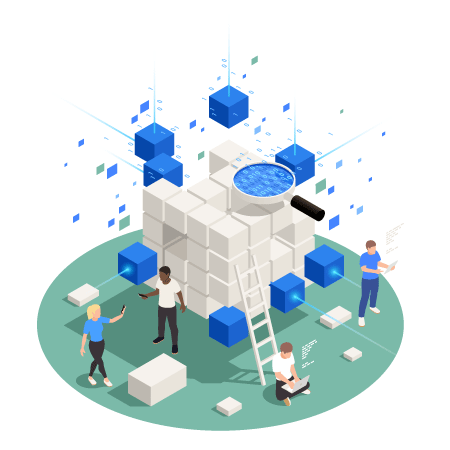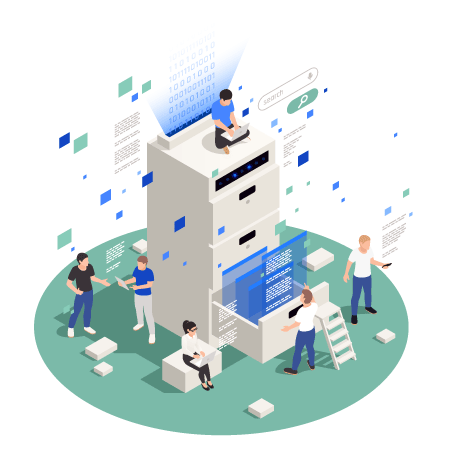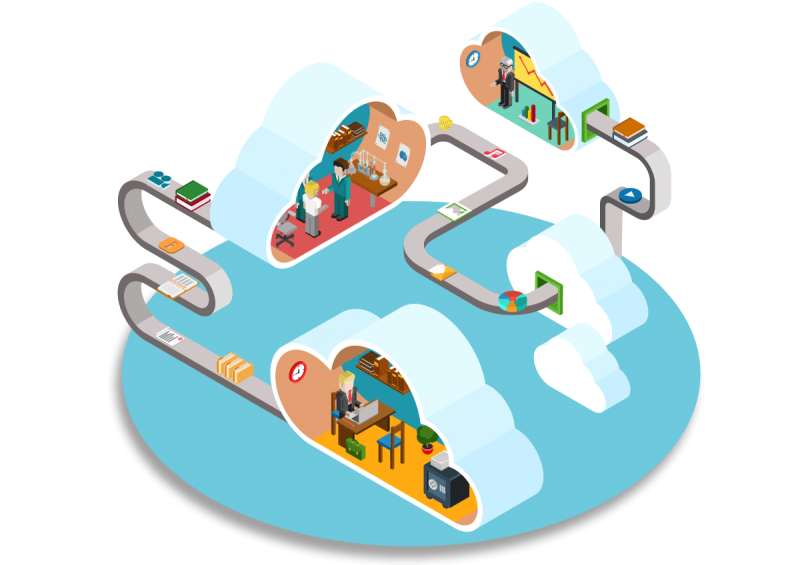What is DevOps and Its Significance in 2023
A solid DevOps strategy allows IT and business to boost productivity, improve security elements, and break down data silos. The truth is that fewer businesses now install siloed and complex software solutions to run operations. Instead, most businesses lean toward DevOps
What is DevOps?
In layman’s terms, DevOps refers to a combination of tools, processes, and people. The idea is to deliver software solutions in a prompt and reliable manner. But that’s just the simplified viewpoint of DevOps – the rabbit hole goes much deeper than that.
Right off the bat, when companies adopt and embrace DevOps, it allows them to bridge the gap between operations and developer teams. Consequently, from the planning stage to the delivery stage, DevOps fosters more collaboration across different phases of the software development life cycle.
Keeping that in mind, let’s touch on the fundamentals, benefits, methodologies, processes, and best practices of DevOps and why it matters for enterprises in 2023:
Mechanics of DevOps: Simplified
Before adopting and embracing DevOps, the burden of responsibility falls on enterprise leaders to learn about the DevOps fundamentals. After all, you want to ensure you’re heading in the right direction based on your needs.
When it comes to DevOps implementation, for a lot of leaders, either it’s going to be faster or more cost-effective deliveries. Once you figure out “your” needs, you can make changes in the architecture. Ultimately, it boils down to the user journey, which determines how DevOps functions for a company.
In most instances, there’s no simple or straight answer. For starters, business leaders must not be reluctant to change and take risks proactively. Similarly, business leaders should not be overly dependent on documentation. Business leaders also shouldn’t overlook the required cultural changes to successfully implement DevOps.
So, if business leaders implement DevOps among internal teams, it is vital to have an objective view of the process and answer custom questions about the leadership roadmap. And this stands for whether or not you will be able to support your architecture and make high-quality and fast deliveries.
DevOps automation tool

DevOps Vs Agile
Agile is arguably the most popular software development methodology. However, there is a difference when it comes to Agile and DevOps. For instance, Agile revolves around delivering software within a short cycle and considers customer feedback.
Specifically, the agile methodology focuses on continuous collaboration and improvement across all functional teams. On the flip side, DevOps is a holistic approach to the software development life cycle. In fact, it revolves around “development” as well as “operations.”
Agile methodology focuses on improving the overall software development quality. Conversely, DevOps involves improving the quality of delivery.DevOps is all about ensuring the code gets out in a repeatable, prompt, and reliable manner.
Moreover, it is crucial to understand that DevOps is complementary rather than a replacement. Most business leaders implement agile DevOps methodology in order to accelerate the entire software development process.
What’s the Difference Between DevOps and DevSecOps?
Whether it’s agile vs DevOps or DevOps vs DevSecOps, discourse continues to be in the spotlight. DevOps involves operations and software development teams working together throughout the software development process. Through this collaboration, DevOps teams share similar KPIs and goals.
The objective of the DevOps team is to make development life cycles faster and shorter so that companies can make frequent releases. Simultaneously, this allows the company to maintain high-quality, predictable, and resilient software.
Also, DevOps engineers focus on the best approach to implement software updates faster and reduce the overall disruption at the same time.
The emphasis is on delivering software faster because DevOps teams often overlook some security elements. But immediate security relegation at the end of the process helps teams spot potential security vulnerabilities that might compromise the company’s assets, applications, and user data.
Still, this is where DevSecOps comes into play. It is essentially the next step of DevOps where engineers don’t overlook security measures. DevSecOps rose to prominence since DevOps teams realized and recognized that the old-school approach to implementing DevOps was not practical until the process had security measures in the data pipeline.
So, what does this mean? Well, instead of reviewing and applying security measures at the end of the software build process, DevSecOps ensures security management is integrated from the development stage to the implementation stage.
When it comes to DevSecOps, overall security becomes a priority for the DevOps team. In the context of DevSecOps, the main goal is to deploy security measures quickly and without compromising the safety and scalability of the software. With DevSecOps, collaboration is a continuous process and involves security teams as well as release engineers. In DevSecOps, creating secure code and delivery speed aspects are paired and streamlined.
Suppose there is a serious security problem, in that case, it is addressed immediately as soon as it is identified rather than waiting for “it” to compromise or threaten the entire software development process.


Understand the Growing Need for DevOps
With DevOps in the picture, it becomes possible for the support and development teams to work side-by-side. What’s interesting is that this integrated style of work delivers value.
You’d be surprised how many businesses have yet to realize the need to adopt DevOps. But in many cases, business leaders don’t have a clear idea of how to deploy it.
In the saturated and competitive marketplace, it has become vital for enterprises to implement DevOps methodologies. This is how businesses can streamline their internal processes and ensure high quality across their software delivery processes.
As the needs and demands of customers change, it is up to businesses to perfect their user experiences. And whether it’s mobile, web apps, wearables, or IoT devices, it takes a continuous delivery model like DevOps to make that happen.
When operations and development are combined and concentrated, it allows companies to create more customer-centric, consistent, and better applications.
Standard DevOps Methodologies
Benefits of DevOps
Reliability
DevOps involves continuous delivery and continuous integration, which ensure the high quality of software infrastructure and updates. This allows teams to deliver software more reliably and speed up the software development process without compromising the user experience.
Quick Delivery
When it comes to making frequent releases more efficient, DevOps allows teams to improve the delivery process faster and help companies gain a competitive edge.
Speed
One of the hallmark aspects of DevOps is that it allows teams to innovate and move faster. As a result, teams adapt to new changes faster and help companies get better results.
Heightened Security
Companies can implement a DevOps methodology without having to worry about compromised security by using integrated and automated security tools.
Improved Collaboration
In DevOps, operations and development teams work closely, combine workflows, and share many responsibilities. All of this saves valuable time and improves the efficiency of the software development process.
Key Roles of DevOps
You may not realize it but 263,000 jobs were created in the IT industry in 2022, an increase of 54,000 jobs from 2021. Interestingly, more and more roles are being filled to build DevOps teams. However, recruitment agencies highlight that there is a significant skills gap, which makes it challenging to find DevOps experts for a wide range of organizations.
Here are the essential DevOps roles you should be aware of:
Code Release Manager
This is a project manager job in the context of DevOps methodology. The code release manager is responsible for figuring out “when” and “how” to make the most out of agile practices.
DevOps Evangelist
A DevOps evangelist ensures that the team is able to deploy DevOps processes successfully across the board. Technically, a DevOps evangelist refers to a change agent who delivers change within a DevOps culture.
Experience Assurance Expert
An experience assurance specialist ensures the final product’s end-user experience is smooth. This individual ensures the product works properly with supported features that are easy to use.
Automation Architect
An automation architect or specialist develops automated processes to minimize manual tasks. Automation architects ensure the creation of highly efficient development processes and identify critical tools so that they can be integrated into a DevOps methodology.
Security and Compliance Engineer
As the title suggests, the security and compliance engineer or office takes care of the system security. In the context of DevOps, security and compliance engineering is part of the software development process and involves integrating relevant security measures across different stages of product development.
Software Developer
A software developer writes code, and in the context of DevOps, this individual conducts tests, implements software/products, and is responsible for continuous monitoring. Software development is a multifaceted role and can involve a lot of responsibilities. This role is not too different from a conventional developer who solely focuses on writing code.
DevOps Processes, Principles, and Practices
Here are the basic principles of DevOps:
-
Infrastructure-as-Code
This principle allows system administrators to take care of infrastructure settings just like writing code. It means system administrators store data in controlled repositories, use automation, monitor changes, and implement and manage them. -
Continuous Delivery
This principle highlights the automation of the software development and implementation processes. It ensures new code is delivered to end users in a reliable and prompt manner. The continuous delivery principle allows a team to release an application at any time and without manual intervention. -
Continuous Feedback
This principle propels businesses to collect and analyze end-user's and stakeholders’ feedback continues to improve software products or services faster. -
Collaboration
Collaboration is the hallmark principle of DevOps and involves bringing operations and development teams together to identify and address obstacles. -
Security
At every stage of the software development process, teams need to consider security. This principle is an essential component of the DevOps culture and ensures security is not an afterthought.
Essence of Processes and Best Practices Around DevOps
- Many DevOps processes and best practices allow companies to innovate and deploy faster. This streamlines and automates the whole software development and management process.
- One of the basic DevOps practices is making small and regular updates. Incremental updates improve the performance and speed up the software release.
- No matter what DevOps methodology your company uses, make sure to make updates more often than other companies that usually depend on conventional software development processes and practices.
- Collaboration and communication are fundamental DevOps practices. Similarly, automating the software delivery process creates more room for collaboration and brings all the responsibilities and workflows together.
- Essential DevOps practices like continuous delivery and integration allow teams to deliver reliable, safe, secure, and fast software delivery.
- So, ensure communication across operations and developers so that different organizational departments can work together closely on different projects and goals.
PaaS - The best choice for a DevOps environment
DevOps, at its core, promotes collaboration and faster software delivery through incremental automation and continuous improvement analysis. DevOps can significantly enhance efficiency and accelerate software delivery when combined with agile methodologies or other software development processes.
Enter Yuan Jhen DevOps PaaS, a remarkable service designed to optimize the DevOps environment. Integrating Platform as a Service (PaaS) with DevOps principles offers a comprehensive feature set tailored to streamline development, deployment, and scalability. DevOps PaaS combines the strengths of PaaS and DevOps, creating a unified platform that simplifies the management of infrastructure, operating systems, and hardware. This allows teams to concentrate on core tasks and drive productivity.
DevOps PaaS provides robust support for a wide range of programming languages and frameworks, including Java, PHP, Ruby, Node.js, .NET, Python, and Go. This flexibility empowers development teams to utilize their preferred tools and technologies, enhancing productivity and adaptability.
Moreover, DevOps PaaS boasts extensive pre-configured clusters tailored to popular applications such as WordPress, Magento, MySQL, PostgreSQL, NGINX, and Tomcat. This library of clusters enables developers and DevOps teams to rapidly select and create specific applications and services without manual configurations, saving valuable time and effort.
The Platform dynamically adjusts resources based on demand, ensuring optimal performance, scalability, and cost-effectiveness. This feature aligns seamlessly with the core principles of DevOps, empowering organizations to meet customer demands and adapt to evolving market conditions effectively.
To summarize, leveraging Yuan Jhen DevOps PaaS allows organizations to establish a robust and streamlined DevOps environment. With support for diverse programming languages, a rich library of pre-configured clusters, and automated scaling, DevOps PaaS enables teams to collaborate seamlessly, deliver high-quality software, and achieve faster time to market.
DevOps PaaS Solution




